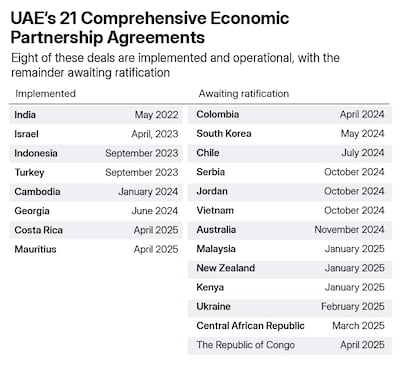US President Donald Trump’s so-called “Liberation Day” tariffs have led to a profound recalibration of global trade relationships, sending shock waves through international markets.
While subsequent partial rollbacks have eased some immediate concerns, the unmistakable shift toward a more protectionist US trade policy is compelling allies, competitors and corporations alike to rethink long-held commercial strategies. The Gulf states are emerging as key beneficiaries of this new order.

Across the Gulf, tariff levels remain among the lowest globally, generally capped at 5 per cent. Even a theoretical doubling would leave the region competitively positioned, especially compared to new tariff-affected jurisdictions. Crucially, oil and gas, the cornerstone of many Gulf economies, remain largely exempt from US tariffs, and American demand accounts for only 3 per cent of the Gulf's non-oil exports.
In an environment where global supply chains are under severe strain, the Gulf’s business-friendly trade environment offers an increasingly attractive alternative for manufacturers and exporters. Companies under pressure to diversify away from traditional US-centric supply models will probably view the Gulf not merely as a regional hub, but as a global platform from which to access several markets efficiently.
Manufacturing, re-exports and research
The potential for the Gulf to capture a greater share of global manufacturing and re-export activity aligns neatly with the region’s long-standing diversification strategies.
Initiatives such as Saudi Arabia’s Vision 2030 and the UAE’s Operation 300bn industrial strategy underscore the political will to shift away from hydrocarbon dependency.
Combined with their development of local research and development capabilities in universities and institutes, the Gulf countries could develop their industries further by attracting some of the academic researchers who may be reconsidering their futures at universities in the US. This ambition has been part of the UAE’s strategy for several years now and should accelerate, given the building blocks are in place. In this sense, global trade turbulence could act as an accelerant for structural economic reform, rather than an impediment.
Furthermore, with many multinationals reconsidering their exposure to both the US and China, the Gulf's modern logistics infrastructure, free trade zones, and globally connected ports make it a logical choice for companies seeking a neutral, stable base.
Benefitting from shifting Chinese trade flows
The Gulf may also be a beneficiary of redirected Chinese exports. As China faces increasing barriers to the US market, producers are looking for alternative destinations to offload surplus production.
Unlike Europe or South-East Asia, where local industries might be more vulnerable to cheap Chinese competition, the Gulf’s economic structure shows limited direct overlap with Chinese manufacturing. This gives the consumers in this region access to more affordable goods without causing the type of domestic political backlash seen elsewhere.
Strategically, Gulf states are not standing still. Led by the UAE, the region is moving rapidly to deepen international trade ties. The imminent Comprehensive Economic Partnership Agreement (Cepa) between the UAE and the EU highlights an outward-looking, proactive approach that stands in sharp contrast to the inward turn now evident in Washington.

The UAE’s recent success in signing several Cepa deals, with countries ranging from India to Indonesia to Turkey, illustrates the agility of Gulf states in adapting to a more fragmented global trade landscape. This new wave of bilateralism effectively compensates for the decades-long failure to finalise a comprehensive EU-GCC free trade agreement. And needless to say, Mr Trump’s coming trip to the region, following on from sizeable investments pledges into the US, also speaks to the importance Gulf leaders attach to maintaining strong bilateral relations with the White House.
Nevertheless, the Gulf’s path is not without risk. The International Monetary Fund’s recent downgrade of its 2025 global growth forecast to 2.8 per cent, down from 3.3 per cent, underlines the fragility of global demand. Any prolonged downturn would inevitably weigh on oil prices, a critical revenue stream for Gulf budgets.
Producers like Saudi Arabia, with a fiscal break even oil price near $90 per barrel, remain vulnerable to sustained market weakness. In contrast, the UAE, with a break even closer to $50 per barrel, is better positioned to weather volatility. Fiscal strain in oil-dependent states could reverberate through regional economies, dampening private sector growth and delaying diversification timelines.
A youthful market for global companies
Yet even here, opportunities emerge. European and UK companies increasingly view the Gulf as a vital growth market, attracted by its youthful demographics, rising middle classes and expanding domestic consumption. In a world where many mature economies face stagnant demand, the Gulf’s dynamic consumer base stands out as a rare source of expansion.
The region’s strategic geographic positioning, at the crossroads of Europe, Asia and Africa only enhances its appeal as supply chains pivot away from old models.
A window of opportunity
While US protectionism poses considerable challenges for global trade, the Gulf states appear unusually well-positioned to adapt, and even to thrive. Proactive trade diplomacy, globally competitive tariffs, world-class logistics infrastructure and favourable demographics combine to give the region a critical edge in an uncertain world.
If Gulf economies continue to leverage these advantages with strategic foresight and maintain momentum on diversification, the coming decade could see the region transform from a secondary player to a central hub in the evolving global trade architecture.
Simon Penney is managing partner and chief executive of Incrementum CGA, and former UK HM Trade Commissioner for the Middle East



